Please Take Note: This is a review of the game’s final prototype. The art, game bits, and the rules discussed are all subject to change. The game is being reviewed on the components and the rules provided with the understanding that “what you see is not what you might get” when the game is published. If you like what you read and want to learn more, we encourage you to visit the game’s official web page or visit the game’s Kickstarter campaign. Now that we have all that disclaimer junk out of the way, on with the review!
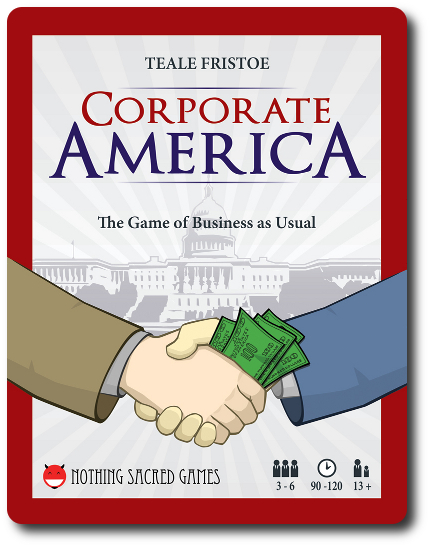
The Basics:
- For ages 13 and up (note: game is not appropriate for little Child Geeks)
- For 3 to 6 players
- Approximately 90 minutes to complete
Geek Skills:
- Active Listening & Communication
- Counting & Math
- Logical & Critical Decision Making
- Reading
- Strategy & Tactics
- Risk vs. Reward
- Cooperative & Team Play
- Hand/Resource Management
- Self-confidence
- Imagination
- Bluffing and Misdirection
Learning Curve:
- Child – Assumed easy, but not tested
- Adult – Easy
Theme & Narrative:
- As a large corporation, you have needs and those needs can be obtained by manipulating the political system
Endorsements:
- Gamer Geek approved!
- Parent Geek approved!
- Child Geek not appropriate!
Overview
It used to be a dog-eat-dog world. Now dogs are out of the picture and giant corporations dominate the top of the food chain. These huge, international companies only focus on two things: making money and influencing others to make more money. It’s all about maximizing profits and to do that you need to get governments to see things “your way”. Make good business deals, befriend politicians, and change the rules of the game so you will always win. Welcome to Corporate America, the land of the bought and sold.
Corporate America, by Nothing Sacred Games, is comprised of 60 Business cards, 54 Consumption cards, 40 Legislation cards, 8 Executive Privilege cards, 1 game board, 1 Phase token, 1 Silly Hat token, and an assortment of currency in the values of $1, $2, $3, $5, $10, $20, and $50. As this is a review of a prepublished game, we will not comment on the game component quality. We will, however, say THANK YOU THANK YOU THANK YOU to the game designer for publishing the currency on cards instead of the paper currency you often see in Monopoly. Words cannot describe how much of a pain paper currency is in regards to game bits.
Game Set Up
To set up the game, first place the game board in the middle of the playing area.
Second, take the currency cards and deal out to each player their starting money for the game. This is based on how many players are sitting around the table.
Third, place the currency not dealt to players to one side of the board in separate decks organized by their currency values. This area of the game is now referred to as the Treasury. A player can be elected to run the Treasury to ensure that no players steal from it or everyone can just be honest. The Treasurer will be responsible for collecting, paying, and changing currency values for larger or smaller denominations. When playing with adults, it is often faster to simply let all the players do this themselves.
Fourth, shuffle the Business cards and deal to each player a number of cards based on the number of players at the table. These cards can be looked at by their owning players but should be kept hidden from their opponents at all times. Place the remaining Business cards, face-down, on the Business deck space on the game board.
Fifth, shuffle the Consumption and Legislation cards and place them, face-down, on the Consumption and Legislation deck spaces on the game board.
Sixth, shuffle the Executive Privilege cards and deal out, face-down, a number of cards based on the number of players at the table. These dealt cards are placed, face-down, on the Executive Privilege deck space on the game board. The remaining Executive Privilege cards are removed for the duration of the game.
Seventh, place the Phase token on the Wall Street circle space on the game board.
Eighth, determine who the first player is and give that individual the Silly Hat token to signify that they are the President for this round or make them wear a silly hat.
That’s it! You are now ready to play the game of corporate greed and manipulation.
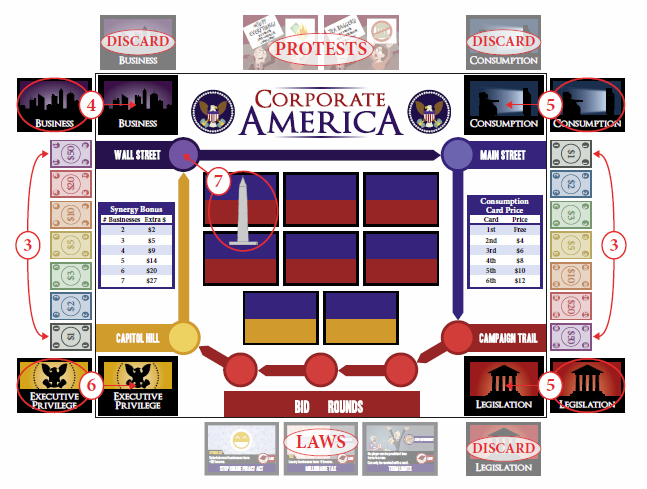
Example of the game board — ignore the numbers
Playing With Money
The game is played in rounds with each round consisting of 4 phases and each player having 1 turn per phase. The phases are meant to symbolize the steps a corporation must take to influence the laws of business and trade in order to benefit their bottom line. The phases are as follows:
Phase 1: Wall Street
Ah, Wall Street. The birth place and slaughterhouse of so many dreams. This is where it all starts and just might end. To begin with, move the Phase token to the Wall Street space (if it is not there already). Once it is there, each player (starting with the President and going clockwise) will complete the following steps:
- Draw 2 Business cards
- Discard 1 Business card from the player’s hand
- Start 1 business by playing a Business card from the player’s hand and paying to the Treasury the amount it costs to get the start-up off the ground. The Business card is placed in front of its owning player, face-up.
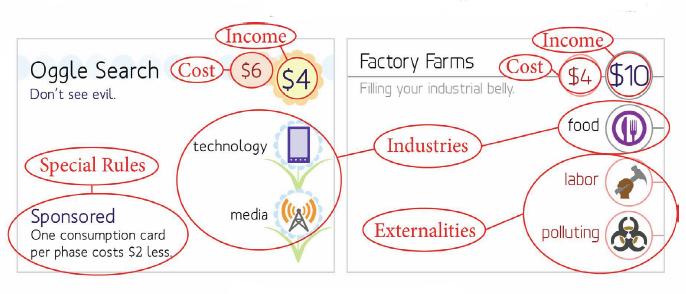
Example of 2 Business cards in the game
Note that the first round allows players to buy more than one business during this phase, but all future turns in this phase only allow the player to buy 1 business. Once every player has purchased a business, it is time to move to the next phase and shift the phase token.
Phase 2: Main Street
Now that the businesses have been created, it’s time to get its goods and services sold. Consumption is the goal of this round. When a consumer buys your product, you make money. It’s that simple. Starting with the President and going clockwise, each player will complete the following steps:
- Draw 1 Consumption card from the Consumption deck and add it to the player’s hand. If the player likes, they can draw another Consumption card, but it will cost them $4. The third will cost them $6. The forth will cost $8 and so on with the value always increasing by $2. Any protesters that are drawn are temporarily set aside and used during the Capitol Hill phase.
- Play 1 Consumption card. The Consumption cards will show what product is in demand. If it matches any player’s business, the income derived from that business is taken from the Treasury and awarded to that player. Play Consumption cards to 1 of the 8 Consumption spaces on the game board. It is perfectly legal to accept small payments from other players who would like to give you a little incentive to play certain Consumption cards. Players should name their price. Any Consumption cards not drawn and played on the player’s turn are discarded.
- If all 8 of the Consumption spaces on the game board have not been filled, the next player can go.
If a player has more than one business that creates the same goods or services, they have created corporate synergy. This awards the player more income when a Consumption card is played that matches the businesses. The bonus is noted on the game board.
Once all 8 of the Consumption spaces on the game board are filled, regardless if each player has had 1 or more turns, the phase ends. Time to take a hike on the campaign trail and shift the phase token unless the endgame condition has been met. If it has, the game ends here.
Phase 3: Campaign Trail
The corporations have made a lot of money, but they can make more. By influencing would be candidates for political office, corporations can start to control who will be in the most powerful legislative position in the land, the President. What fun, but sadly, no bribes are allowed because that would be illegal. Campaign donations, however, are perfectly legal! Starting with the President and going clockwise, each player will complete the following steps:
- The current President selects one player to draw and reveal the top 6 Legislation cards from the Legislation deck. These are placed on the game board for all to see and are now the election issues. Based on the businesses owned by the players, some of these issues will be super great and the others super bad.
- Any player can now attempt to convince the other players that they would make a better President. This is demonstrated by the players stating which of the 6 Legislation cards in play they would enact. Most likely, the job will be given to the player who promises they can make the other players the most money, but not always.
- After all the players who want to become the next President have had a chance to talk (and players should feel perfectly free to debate and argue with each other), move the Phase token to the first bid circle on the board.
- Starting with the current President and going clockwise, players will now put as much money, face-down, in front of the candidate of their choice to win the Presidency. It is perfectly fine for a player to bid on themselves, too. A player can also pass, but by doing so, they are out of the election. Once everyone has had a chance to bid, the Phase token is moved to the next bid circle and every player can again place as much money as they like down in front of the player of their choice. After three bid rounds, the campaign is over and the Phase token is moved to Capitol Hill!
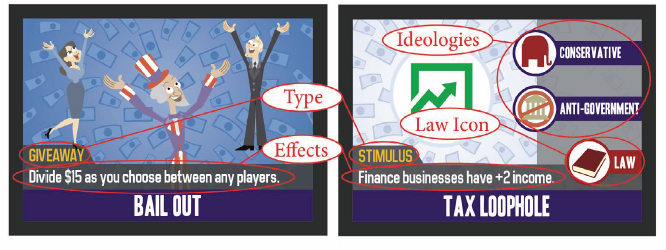
Example of 2 Legislation cards
Phase 4: Capitol Hill
Now it’s time to see if all that wealth was put to good use!
- Flip over the piles of money contributed to individual player’s campaigns and tally up the total. The player who has the most currency pledged is the new President! Huzzah! The system works! If there is a tie, players should consult the Supreme Court judge. This is done by asking a 3rd party to pick a number at random in a given range and then ask each candidate, who are part of the tie, to select one number. Based on the Supreme Court judge’s ruling of who is or is not closest to the actual number, the tie is broken and victory goes to the player who won. Or, in other words, pick a number 1 through X. Yes, truly, the legal system is terribly complicated.
- All campaign donations are now collected and given to the Treasury. At this time the former President turns over the office and responsibilities to the new President. Feel free to make a big deal out of it. The Silly Hat token is now placed in front of the new President.
- The new President’s first order of business is to take the top Executive Privilege card and add it to their hand. This card can be used whenever the card says so and even if the player is no longer the President. The first player to be President doesn’t get one of these because life is unfair.
- The new President’s first act is to clean up the mess left by the prior administration. One and only one law currently in play (as indicated on a Legislation card) can now be removed from the game board. The President then deals 2 Legislation cards and places them, face-up, on the game board.
- Now the President chooses 3 of the possible 8 Legislation cards in play to enact unless there are active protesters. The protesters force the President to select legislation that will appease the mob, so to speak. If there are no protesters, all the protesters have been satisfied, or there is no legislation available to appease them, the President is free to do as they choose. The President might or might not remember their campaign promises so the other players should feel free to remind the President. Any protesters that were not appeased stick around to bother the next President elect.
- Selected legislation that is not law immediately takes effect and is then discarded. Legislation that is law stays on the board and remains in effect until revoked by the President.
The round is now over. Start a new round with phase 1. Back to Wall Street!
The Golden Parachute
If there are no more Executive Privilege cards left in the deck at the end of the Main Street phase, the game ends. All the players now total their currency. Any unused Executive Privilege cards are worth $5. Whichever player has the most currency wins! In case of a tie, go speak to the Supreme Court.
Note that there are a lot of special rules driven by cards that influence every phase of the game. At its core, the game is exceptionally simple when you only consider the phases as-is. Where the level of complexity and player interaction begins to take shape is when special business, legislation rules, and laws begin to make the act of earning a corporate income a hardship. Players will need to work together to a point and keep in mind there is no second place. Every player is out for themselves, but individual players will need help to achieve victory. The real challenge is tricking the other players to help and not know it!
To learn more about Corporate America (the game, not the corporations within the United States not under government ownership) and read the full rules, visit the game’s official web page or visit the game’s Kickstarter campaign.
Prediction
One can easily assume this game is all serious and stuffy, but it isn’t. The rules make for a fast game with fun player interaction and the cards are full of sarcasm, not pessimism. Well, OK, a little pessimism, but not so much as to suggest the game is all doom and gloom. In short, the game does not attempt to tackle any social, geopolitical, or economical issues plaguing the world today. It does, however, raise its middle finger and blow a very loud raspberry. I found it very refreshing.
We cannot recommend this game for little geeks for two reasons. First of all, the language on some of the cards is not what we here at Father Geek would consider “little geek appropriate”. Feel free to argue all you like, but it really doesn’t matter. When it comes to parenting and determining what is or what is not appropriate for children, the Parents are the first and last word. Some examples of cards we found that lead us to this conclusion are words and phrases like “Crapple”, “Swinger’s Hot Tubs”, and “Porn Emporium” (all companies you can proudly own, by the way). Second, while the rules of the game are very straight forward, the subject matter is not. There’s a lot of politics in this game. Lots. And that is, in many ways, already too much for a little geek to be exposed to.
We should also note that this game is most likely not appropriate for political die-hard conservatives. Odds are a political conservative extremist will play this game, become enraged, and write a strongly worded note to their congress representative, as well as the game publisher. Which I guess just leaves the political liberals, individuals who are 13+ years old, and anyone else who can just see Corporate America for what it is: a game.
Teaching the game to our Parent and Gamer Geeks didn’t take long. As stated, the game’s phases are very easy. It’s the shifting rules and manipulating the other players that’s difficult to teach. We only had a few questions and we even had one player excuse themselves because the game’s subject matter breached on topics that were just too personal to be played with. We were sorry to see them go, but they made us sandwiches, so everything worked out OK in the end.
Before we played our first game, I asked a few Parent and Gamer Geeks their thoughts on the game so far.
“A fairly straight forward game, but I can already see it is going to be fun to play with the right people. I hope we have the right people.” ~ Gamer Geek
“Is it just a coincidence we are playing this game now? In an election year? Hmmm?” ~ Parent Geek
Let’s play the game and see if greed equates to entertainment or if the game leaves us all feeling robbed.
Final Word
So, the game plays a little something like this.
At first, all the players are pretty nice to each other. Everyone is busy buying businesses and the economic market and political system appears to be working fairly well. Money is being invested and goods and services are being produced for people who want them. Huzzah for the free market! But then things start to get a bit ugly. Consumers want more and more and corporations are willing to take shortcuts and more risks that hurts others to keep income flowing. Eventually the corporations begin to squabble among themselves and the election gets rigged. The most popular player get elected, but is also most often the player that is the easiest to manipulate. The system begins to crash and the only way it is kept up is through massive legislation that protects the corporations and hurts the consumers.
Yikes….a bit too close to home for some, I’m sure.
Parent Geeks did find the game a bit too close to certain subjects at times, but did not see this as fault of the game. Instead, they praised the game for not skirting issues, while at the same time not making such a big deal out of them. In the words of one Parent Geek, “this game tells it like it is without being preachy”. The level of player interaction at the table hovered somewhere between friendly and passive aggressive throughout most of the game. Passions became inflamed a few times when a wife thought a husband wasn’t being fair to her (he wasn’t) and two Parent Geeks agreed that they were right and the other was stupid. Despite how it might appear, the game left everyone happy, if not slightly sore.
Gamer Geeks took what the Parent Geeks observed and cranked it up to 11. Nasty, nasty people, the Gamer Geeks. Cutthroat, bitter, manipulative, and swindlers. Oh, what a wonderful time they had! The only negative comment one of the Gamer Geeks had was that some of the cards were a bit too topical to remain relevant. This, they believed, would make the game less interesting because half of the fun of the game was getting super excited for or against a card that comes into play. Or, to put it another way, to play with politics while you played the game.
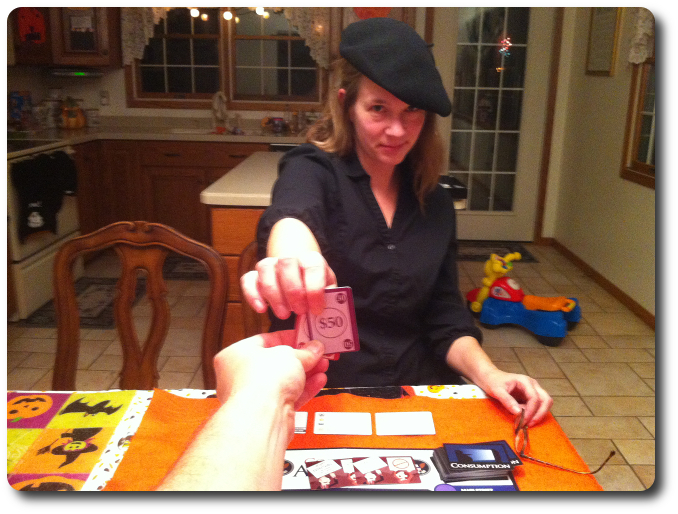
The current President gladly accepts a “vote of confidence” from me
Gamer Geeks, the game is very straight forward and easy to play, but difficult to win. You are dependent (to a point) on the other players to either help you or stay out of your way. The only way to keep the other players on your side is to keep them happy via bribes, promises (that you might or might not keep) and giving up short-term gains for long-term benefits. This makes the game surprisingly social and often times, mean. Players must go against each other, lie to one another, and backstab left and right in order to get ahead. The trouble is, everyone else is doing it, too. While it might seem chaotic, the game moves along at a good pace and there were never any points where the game didn’t naturally progress. This game was approved by your peers due to the interesting and complex mix of tactics and strategies each player had to use to get ahead of their opponents.
Parent Geeks, this game was met with mixed levels of endorsement, but your peer group ultimately decided to give it a thumbs up for two reasons. First, the game is fun and challenging with a high level of social interaction. The game play is not difficult and the ever-changing conditions due to legislative actions keeps all the players engaged and re-thinking how best to get ahead without reducing their level of support. Second, the game does bring up some political points that some find difficult to discuss without becoming overly emotional. The game does not suggest that players attempt to defend or attack any suggested political view and neither conservative or liberal topics are championed. The game is just political issues without the politics other than those that the players bring to the table. But personal politics play no part in the overall game. The Parent Geeks found this surprisingly refreshing and somewhat therapeutic. The only shared negative view of the game across all Parent Geeks was the language on some of the cards (as already mentioned) that they found to be funny and witty, but unnecessary This made the game inappropriate for a family game until such time the Child Geeks at the table were mature enough to handle it.
Sorry, Child Geeks, but this game contains a bit too much rude humor and colorful language to make this a game that is appropriate for you. When you get older, and your mom and dad say it’s OK, you’ll have a chance to sit at the table and buy or sell off America one bit at a time. Until then, practice by playing Monopoly and making crazy deals and trades with your opponents. While not the same game or experience, you’ll start to develop the necessary skills to recognize good deals and when to support your opponents when it benefits you.
I very much enjoyed Corporate America and have yet to play a game where I was not challenged, engaged, and terribly frustrated with my fellow players. The game does a great job of making you absolutely dependent on them to achieve your ultimate goal, but since there is only one winner, you must play to their likes and dislikes, make promises, and silently creep your way to the winner’s circle without your opponents seeing it. This proved to be ridiculously tough at times, especially when playing against like-minded and aggressive players.
The game has three issues, in my opinion, but none are detrimental to the overall game play or to the value of the game itself.
First is the language on the cards which makes the game immediately inappropriate for younger audiences. I think this is a terrible shame because the game does a great job of demonstrating how the political system is somewhat flawed but ultimately workable to achieve positive ends. In a time where our televisions and radios are being bombarded here in the United States with political campaign pitches and mud flinging, being able to grasp the political system by the nose and turning its head towards an outcome you want to achieve is very liberating. Never mind that this is only possible via a game board. The little geeks, however, could benefit from learning more about these political issues and how their world works. A golden opportunity was missed here.
Second, the political cards and legislation are exceedingly timely which makes the game almost a bit too visceral for some. There are some political issues in the game that can very quickly divide the table into two equally passionate camps for or against it. This is perfectly fine, as far as I’m concerned, and I always encourage political discourse if it is done intelligently. The game does not provide this platform, however, and does not suggest that people debate anything specific, which is justifiable because the real world politics have nothing to do with the game’s final outcome. But this is also a possible flaw as the game’s relevancy will eventually become nonexistent as the political issues will one day (hopefully) be resolved. In some ways, this gives the game a freshness date that indicates when the game will no longer be of much interest, as the topics it covers are no longer relevant to the players. Of course, for many of the topics the game covers, this game will sadly be relevant to many for a long, long time.
Third, the game is very much geared towards an American audience or an audience who is familiar with the current American political and economic system. While it is not necessary to be a United States citizen, a political junkie, or a socioeconomicist to play and enjoy the game, the context might be somewhat vague or totally confusing. This makes the game difficult to sell over seas in the same way playing a game about the current European sovereign-debt crisis would be difficult to explain and play in the United States. Again, while not necessary to understand one bit of any part of the American political or economic engine, the theme and narrative is what will drive many to play the game or to avoid it. Some out of personal or political reasons, and for those geeks over seas, lack of interest.
Regardless of what I see as issues, they are not flaws, and games like this need to be made. The level of escapism that a game can provide is always a welcome thing, but a game should also provide perspective. This game does that without asking a player to pick a side or wrestle with any sense of morality regarding personal political convictions. What it does demand from the player is thinking how short-term gains can impact long-term goals and how the smallest of political points can turn into social unrest. Politics are difficult enough and games that deliver such cumbersome ideas clearly, quickly, and put the player in a position where they see it from a unique perspective are rare. Corporate America does this and does it well.
If you are looking for a game full of political satire, engrossing social play, and an opportunity to flex your skills in manipulation and debate, then make room at your podium and game table for Corporate America.
This game was given to Father Geek as a review copy. Father Geek was not paid, bribed, wined, dined, or threatened in vain hopes of influencing this review. Such is the statuesque and legendary integrity of Father Geek.




Pingback: » In Case You Live Under a Rock without Internet Access… Nothing Sacred Games
Pingback: » Can my %@#! Kid Play Corporate America? Nothing Sacred Games
Pingback: » Going Out of Date Nothing Sacred Games
Pingback: » Reviewing Reviews Nothing Sacred Games